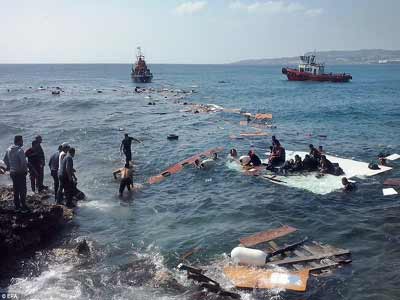
Their livelihood depends on the deep blue Aegean waters they have navigated since childhood but the fishermen of Lesbos today dread what they will find in their nets.
The waters around this Greek island have become a graveyard this year for hundreds of people, including children and infants, seeking safety and a better future in Europe.
“We are afraid to sail out because we might find the bodies of children or run into armed traffickers,” says Christos Dimos, a grizzled fisherman in his sixties who has spent all his life in the northern Lesbos village of Molyvos.
Like many other villages on the island’s northeastern flank facing Turkey, Molyvos has found itself on the front line of the greatest migration crisis facing Europe since World War II.
Nearly 800,000 people have made the perilous journey across the Mediterranean this year so far and more than 3,400 people have died or gone missing trying to reach Europe, according to the International Organisation for Migration.
– ‘A tragedy every day’ –
Greece’s junior interior minister for migration, Yiannis Mouzalas, on Friday said more than 100 people had died in the Aegean in the last seven months.
“There is a tragedy every day,” Mouzalas said during a visit to the Italian island of Lampedusa, which handles an equally heavy strain of migration from Libya.
The fishermen of Lesbos say their way of life had already been dramatically affected by the economic crisis gripping Greece since 2010, which for them means higher fuel tax and falling incomes.
Now they fear that the mounds of flotsam left behind in the migration wave could impact fishing stocks.
“Petrol and debris seep into the depths of the sea and considerably pollute fishing waters,” says Nikos Katakouzinos, a fisherman from the coastal village of Skala Sykamineas.
“Perhaps in a few years we will have killed all marine life and will have to seek a job elsewhere,” he muses.
“Our nets are damaged by driftwood and plastic from the migrant boats that sank,” says Dimos.
And if tourists are discouraged from visiting the island next year because of the migrant influx, things could get worse for the locals.
– Rescues now ‘routine’ –
Depressed or not, the fishermen do not hesitate to plunge headlong into the rescue when migrants are in peril in the stretch of water they know inside out.
“When you see a boat sinking with children on board, you cannot help being upset…you have to act,” says Dimos.
On October 30, Katakouzinos says he jumped into action when he spied a boat with 200 people on board in difficulty a short distance from his village.
“I had not sailed out that day, there were winds of 50-75 kilometres (30-46 miles) an hour blowing,” he recalls.
“I was walking around the port at 7 am that day, and I saw this boat sinking. I rushed to it without thinking even though it was risky. We managed to get everybody ashore, safe and sound. It was a good day,” he says.
“Sadly, rescuing migrants has become routine here,” says Katakouzinos, noting that the coastguard has just two vessels stationed in the area and often turns to them for help.
Greek daily Ethnos earlier this week had a similar story from the island of Chios, where fisherman Stefanos Zannikos recently braved gale-force winds to save 80 people including 20 children.
“The men in the boat were throwing the children (over to us) like basketballs,” Zannikos told the daily.
“One pregnant woman was soaked to the bone and was shivering like a fish. I covered her with a blanket but she continued to shiver, so I took off my socks and gave them to her. She had turned blue,” the 49-year-old father of three said.
However, on October 28, 29 people including 14 children died off Lesbos.
“I had never seen such a tragedy before,” says Katakouzinos, his voice cracking.
“Winter is just beginning. A lot more people are likely to drown,” he adds.
The fisherman’s face darkens when he talks about the traffickers who profit from the migrants’ misery, packing them into unseaworthy dinghies that cannot withstand deteriorating weather conditions in the Aegean.
“Even when the sea is raging and the waves are two metres high, they are not bothered,” he says.
“They send the migrants without caring about their fate. For how long will they be allowed to get away with it?” he asks.



